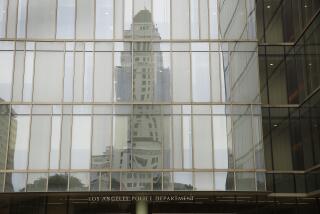Editorial: O.C. gang hearings provide the form of due process while denying the substance
If Orange County Dist. Atty. Tony Rackauckas sued people who he claimed were active members of street gangs, all those individuals would have a legal right to appear in court as parties to defend themselves against the allegation. They would have rights to challenge the claim not only that they are members of a gang, but that the gang exists at all, or that it is indeed a nuisance to the community. They would be able to introduce evidence, request documents and depose police officers whose statements form the basis of the district attorney’s allegations.
Instead, Rackauckas has sued the gangs, which of course failed to show up in court to defend themselves — gangs, after all, rarely appoint chief executives or legal counsel. After winning by default, the prosecutor is seeking to enforce the injunction against the individuals he did not name as parties.
In a landmark ruling two years ago, however, a federal appeals court blocked Rackauckas’ initial enforcement efforts as a violation of the individuals’ due process rights. Undeterred, Rackauckas is offering people he alleges to be gang members limited hearings and limited rights to defend themselves. It’s not enough.
Gang injunctions were a creative response by prosecutors, first in Los Angeles and then elsewhere, to the corrosive effect that gangs had on neighborhoods. As civil instead of criminal actions, they could curb destructive behavior without the necessity of individual criminal prosecutions. But because they restrict fundamental liberties, such as where people can go, with whom they can keep company and what they can wear, they should be subjected to careful scrutiny.
In injunctions filed against three Orange County gangs, individuals who are alleged to be members are now afforded something known as an “active participation hearing.” That gives them a time and a place to challenge the allegation that they are members, assuming they have the legal assistance to present a case. But in lieu of the “discovery” rights that actual defendants have to examine all the material the government has gathered, including evidence that could help their case, the accused gang members are given only a “gang packet” selected by Rackauckas’ office. A hearing without real discovery — with the defense limited by the prosecutor who is seeking to deny the subject’s basic rights — provides the form of due process while denying the substance.
Gang injunctions remain useful tools when tailored carefully and handled properly. But they cannot be used as shortcuts through constitutional procedures. People who are to be subjected to restrictions on their daily activities ought to have a large portion of the rights of defendants, even if they are not full parties to the case.
Follow the Opinion section on Twitter@latimesopinion and Facebook
More to Read
A cure for the common opinion
Get thought-provoking perspectives with our weekly newsletter.
You may occasionally receive promotional content from the Los Angeles Times.










